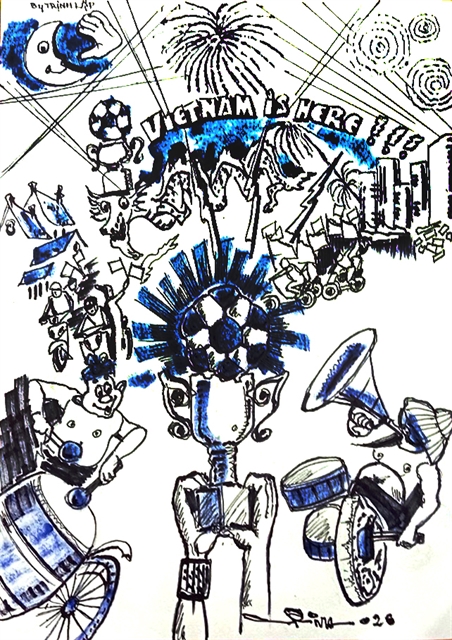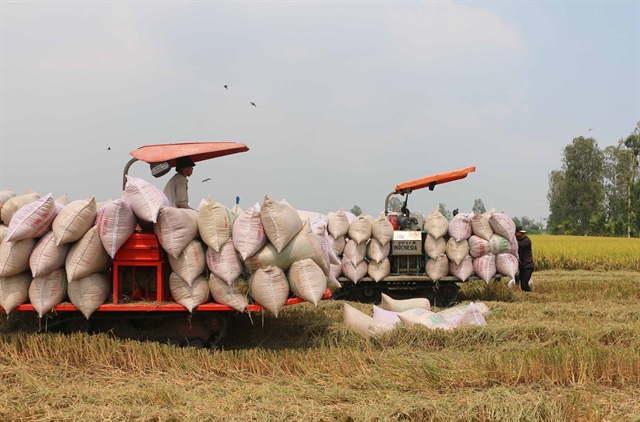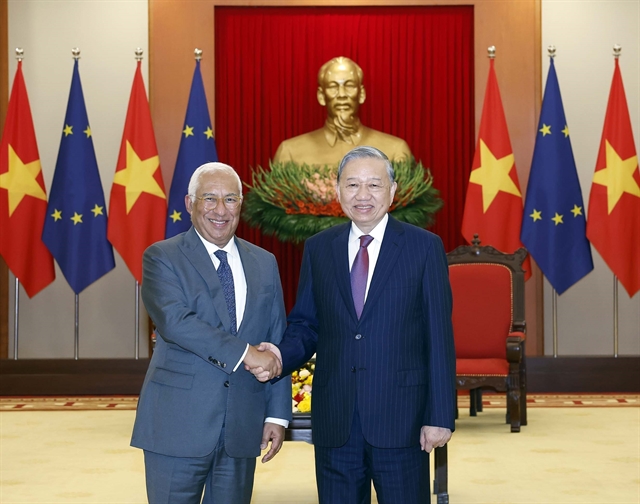 Talk Around Town
Talk Around Town

From the happiest to among the unhappiest? It is a sobering thought that Vietnam has been ranked 94th of 155 countries in the UN’s World Happiness Report 2017.
 |
| Minh Trí |
By Khánh Linh
From the happiest to among the unhappiest?
It is a sobering thought that Vietnam has been ranked 94th of 155 countries in the UN’s World Happiness Report 2017.
The ranking is somewhat shocking, considering that it was not too long ago that we were consistently ranked among the happiest countries in the world with an optimistic population looking forward to a brighter future.
How did we slip so fast? Have we really slipped so far?
Many people seemed to be surprised by the finding in the latest UN report, which was released on the occasion of the International Happiness Day, observed on March 20.
Visitors and other observers still see Việt Nam as a happy and optimistic country. With significant achievements in poverty reduction, impressive average life expectancy, rapid economic growth, and peaceful living conditions with no conflict, no terrorists, Việt Nam has often been listed among the best places to live in the world.
We were ranked among top five happiest places in the world over the past five years by a UK-based New Economics Foundation.
Whence this discrepancy, then?
Before I delve further into this question, it is worth noting that Việt Nam has taken first step in gauging the happiness index of its own people. Although this study is in a nascent state, some criteria have been set to measure happiness, with family and social relationships being a key element in evaluating if a person is happy or not.
Lê Ngọc Văn, who’s heading the research effort, said happiness is not just a personal feeling. It depends a lot on people surrounding a person, especially loved ones.
I have my doubts. Happiness is a human pursuit for sure, but it is also a very subjective, personal thing, I would have thought.
Let’s take an example. Going by the criterial set out in the research project, my mother must be a very happy woman. She’s got everything: a big house, good appearance, a successful husband and two children – a daughter and a son. She’d spent most of her life taking care of the family, and is now enjoying her old age with short-day tours, planting decorative trees, doing yoga and engaging in some social activities. Everybody in my family, including me, assumes she’s happy.
Is she, I now wonder. My mother’s told me many times that she missed the days of working with her film crew, missed the feeling of working. Being a full-time mum was her choice, but if she’d been able to arrange time for both family and career, she would have been much happier.
Then take my cousin, 30 years old, with a high-paid job with a design company. She’s busy working, travelling to all corners of the country, and planning to buy a pickup truck for her future trips. She seems to be content with her life, but her parents are not. They keep urging her to go out on dates, to invite a boyfriend home, get married and settle down.
Honestly, I wish I could be in her shoes sometimes. Born and raised in Việt Nam, I seem to have things covered: a home I love, a career I like, and some peace of mind. Deep inside, however, the question lurks: “Am I really happy?”
Happiness means different things to different people, obviously. For those suffering poverty and hunger, a full meal, adequate clothing and a stable roof above their heads could be a dream come true. Those who are economically better off, are well-read and enjoy a comfortable living standard, might crave doing something “meaningful” with their lives.
When, happiness is difficult to measure at an individual level, how can we do this at a national and international level?
So we get back to the International Happiness Day and the latest UN report.
The unanimously adopted UN resolution that launched this day notes: “Conscious that the pursuit of happiness is a fundamental human goal,[…] Recognizing also the need for a more inclusive, equitable and balanced approach to economic growth that promotes sustainable development, poverty eradication and the well-being of all peoples...”
So there are certainly valid criteria to measure national happiness, a concept presciently introduced by the tiny kingdom of Bhutan more than 30 years ago. Bhutan has backed its rhetoric with action, prioritising GNH (Gross National Happiness) over GDP.
A Guardian newspaper report four years ago noted that the world was taking serious note of what Bhutan was doing. It quoted Thakur Singh Powdyel, as saying: “It’s easy to mine the land and fish the seas and get rich. Yet we believe you cannot have a prosperous nation in the long run that does not conserve its natural environment or take care of the wellbeing of its people, which is being borne out by what is happening to the outside world."
There are echoes of this approach in recent statements by Vietnamese leaders to the effect that the country will not sacrifice its environment for growth. But is there a real focus on the well-being of the people, instead of unquestioning acceptance that “a rising tide lifts all boats?”
As citizens, as social beings who identify themselves with a certain nation, culture or community, we want both individual and collective happiness. So, the question we should ask is: Can we be individually happy when our collective is not?
Alfred D. Souza, an Australian writer and philosopher, has said that happiness is a journey, not a destination. Can this perspective be extrapolated from an individual to a national level?
This is not an abstract, philosophical question. Well, it is, but it is one that has a very serious bearing on the path we take, as individuals and as a nation.
The Guardian piece notes that Powdyel believes the world has misinterpreted Bhutan’s quest.
He should have the last word here.
"People always ask how can you possibly have a nation of happy people? But this is missing the point. GNH is an aspiration, a set of guiding principles through which we are navigating our path towards a sustainable and equitable society. We believe the world needs to do the same before it is too late." – VNS


.jpg)

